The coronavirus virus outbreak has already made over 2,800 victims. The epidemic that has upended the passage to the year of the rat is continuing to have massive ‘butterfly effects’ on global supply chains. Apple announced the outbreak had hampered its production and would affect its revenue. And the Government of China allocated over $10 billion to fight the virus. COVID-19’s human and economic costs provide a powerful example of the biomimicry of modern supply chains and helps underscore important aspects of the ongoing crisis.
The vulnerability of global supply chains to the weighty impact of a disease emphasizes its human nature and instability as a living organism. The parallels between the human disease and economic disruptions show the need to strengthen workers’ voices to create more resilient supply chains.
Poor working conditions and the absence of a functioning grievance mechanism available to doctors on the frontlines of the fight against the epidemic played a key role in the spread of the virus. Li Wenliang’s death after he raised alarms around the new disease in late December has become a symbol of the dysfunctions in enabling effective (health) worker feedback. Lack of personal protective equipment -particularly masks- has also led to the infection of over 1,700 doctors. The enormous costs of the virus illustrate the benefits of a more effective system to guarantee safe and effective worker feedback to prevent health, safety and other potential problems in the workplace.
Yet other workers are also starting to be affected by the consequences of the coronavirus. Construction workers rushing to build hospitals are facing heightened risks of infection and operating 12-hour shifts or longer. China’s Ministry of Human Resources and Social Security has indicated that workers should not pay the price of the virus and required that employers continue to pay personnel even if activities are suspended. However vulnerable workers-notably migrant workers– have reported not receiving pay as they return home. Workers from the Hubei province are also facing different forms of discrimination as they return to work in other regions.
Citizens’ resilience and determination to report on actual conditions in Wuhan also suggest ways information and communication technology can be used to amplify voices to improve working conditions, access to masks and treatment and other remedies.
The unprecedented mobilization to quarantine 50 million people in China and many others across some of the 27 countries affected by the virus perhaps offers some silver lining. In the face of risks of a global pandemic, governments, companies and civil society organizations around the world are mobilizing to curtail the virus and provide assistance to its victims. There will be more victims and the end of the crisis is not within sight. But the determination of the authorities to bring the disease to end in China and beyond suggests tackling large scale societal threats is possible.
The scourge of modern slavery which affects over 40 million people -including 24.9 million in forced labor- represents another major “disease” undermining global supply chains and destroying lives. Solving it would likely require a fraction of the resources spent to fight the virus. Listening to workers in Wuhan would have saved lives and -a lot- of money. There may be no vaccine rapidly available against the coronavirus; but there are significant lessons to help us cure the social and economic ills of our current supply chains.
Please contact us at [email protected] to learn more about how Ulula can help you measure the impact of the coronavirus in the workplace and across your supply chain.
Photo credit: The Times

